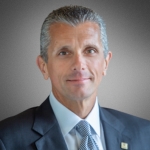
The Cigna Group’s leaders looked to the future and reflected on the recent past during the company’s 2024 Investor Day, held recently in New York City. Chairman and Chief Executive Officer David Cordani and other company leaders spoke with the investment community and shareholders about the challenges presented by today’s health care system and the myriad ways The Cigna Group uses innovation and flexibility to create value for our customers, clients, and partners.
“We are advancing our company with a clear, durable, and dynamic framework that harnesses our diverse set of complementary capabilities deliberately designed to build a bridge to the future of health care across Evernorth and Cigna Healthcare." David Cordani, chairman and chief executive officer at The Cigna Group
The forces reshaping health care are accelerating, he said, while society’s needs are overwhelming the system, which is focused on caring for people who are sick rather than preventing health conditions from developing. “The majority of health care expenses and burdens are preventable and closely linked with lifestyle factors,” he said, such as diet, physical activity, and smoking.
The Cigna Group is aligning our enterprise, strengthening our capabilities, and taking action on behalf of those we serve to address the growing and evolving needs associated with these forces of change, he said. “We see three indisputable forces that are defining the present and emerging state of health care. Vitality levels are plateauing, pharmacological innovation is surging, and innovation – driven by technology – is driving far-reaching impact.”
Cordani sat down with Newsroom reporter Julian Hannush to discuss The Cigna Group's growth and innovation strategy. Watch the full video below.
Vitality levels are plateauing
“The driving force that makes life meaningful and fulfilling for individuals is called vitality – a multi-dimensional view of the quality of one’s life,” Cordani said. “We believe it will be an increasingly important influence on the future of health care.”
Evernorth, the health services business of The Cigna Group, has conducted extensive research into vitality. While our proprietary Evernorth Vitality Index has identified some bright spots, overall vitality is plateauing in the United States, and most Americans are not experiencing high vitality.
In the workplace, people with high vitality are more engaged and more productive. They also tend to have better health and are less likely to be diagnosed with chronic conditions, which are a huge driver of health care spend.
Bryan Holgerson, president, U.S. Employer for Cigna Healthcare, understands the importance employers place on the vitality of their workforce. “While employers have different challenges influenced by the economy, their industry, and their own financial performance, at the end of the day, they’re primarily focused on solving three specific goals,” he said. “First, attracting and retaining top talent, a critical component of which is their benefit plan. Second, ensuring their benefits plan is not only competitive but also affordable, and third, having healthy, productive employees with high levels of vitality who make positive contributions to their business performance.”
We’ve learned that mental health and emotional well-being are essential to high levels of vitality, Cordani said, noting that adults with strong mental health are 10 times more likely to have high vitality than their peers with fair or poor mental health. “We’re seeing challenges with clinician shortages and behavioral care – and we’re actively responding,” he said.
Evernorth’s behavioral health care business serves 23 million customers, said Eric Palmer, president and chief executive officer.
In fact, Evernorth has one of the largest and fastest growing behavioral networks in the U.S., said Eva Borden, president of behavioral health. “We’re not stopping there,” she said. “We are going further to deliver connected behavioral care. Today, we announced the launch of the Evernorth Behavioral Care Group. I’m incredibly excited about this because it is a critical step to advancing access to quality, in-network behavioral care, and advancing value-based arrangements.”
The Care Group launched with more than 1,000 clinicians and intends to be available nationwide by 2025.
“We’re going to enable access to care within 72 hours – industry average is 48 days,” Borden said. “We are going to track key quality and outcome measures, which means we are going to hold ourselves accountable for driving outcomes. And we are going to substantially reduce administrative burdens for our clinicians.”
Pharmacological innovation is exploding
New medications – particularly specialty medications used to treat patients with rare and complex conditions – can offer groundbreaking therapies. “Last year, more than 70% of the drugs approved by the FDA were specialty drugs,” said Matt Perlberg, president of pharmacy and care delivery for Evernorth. Specialty pharmaceuticals are a $400 billion-plus market today, he said. “The specialty market is large. It’s growing quickly. We expect this growth to continue, and we expect that the market for specialty drugs will more than double over the next decade.”
High-cost drugs are becoming available for diseases with broader patient populations, and utilization is increasing, said Adam Kautzner, president of Express Scripts, Evernorth’s pharmacy benefits manager.
Kautzner sat down with Hannush to explore how to effectively manage the fast-growing market around GLP-1 medications, which treat type 2 diabetes and obesity. Watch the full video below.
Heather Dlugolenski, the U.S. employer strategy officer for Cigna Healthcare, noted that specialty medications are among the top health care expenses for clients. “Today, only 2% to 3% of the population has a specialty condition, yet they account for a third of the total cost of care,” she said. The average patient with a specialty diagnosis has total medical costs that are roughly 20 times higher than a patient without a specialty diagnosis.
Perlberg outlined two general categories of specialty treatments: high-prevalence therapies and rare therapies. High-prevalence therapies treat conditions such as rheumatoid arthritis, multiple sclerosis, and endocrine conditions. “It is in this space where we will see the vast majority of biosimilars,” he said.
“Much of the focus on this has been related to Humira, one of the top selling drugs of all time,” he said. “Its costs have increased by more than 40% over the past five years. Throughout the rest of this year, we will continue to see additional biosimilar launches for Humira. That creates competition we can use to drive savings for clients as well as our patients.”
Evernorth plans to have a Humira biosimilar available with no out-of-pocket cost for eligible patients of its specialty pharmacy, Accredo, later this year.
“We can do this because of the capabilities we have at Evernorth as well as across the broader supply chain,” he said.
Biosimilar opportunities exist beyond Humira, he said. “By 2030 we expect that about half of the top 25 specialty drugs will face competition from a generic or biosimilar.”
Rare therapies treat smaller patient populations, so they tend to be lower in volume but have a much higher cost per claim, Perlberg said. These drugs treat the most complex and rare conditions, including hemophilia, pulmonary arterial hypertension, and spinal muscular atrophy.
“There is a robust pipeline of rare therapies coming to market,” he said, which accounted for more than half of the FDA’s new drug approvals in 2023. “Gene and cell therapies treat conditions in this category. There are 21 gene and cell therapies currently on the market, but there are nearly 1,000 more in development. These drugs can cost hundreds of thousands or millions of dollars per patient.”
Perlberg and Dlugolenski sat down with Hannush to discuss how to navigate the cost trend of specialty pharmaceuticals. Watch the full video below.
Innovation – driven by technology – is driving far-reaching impact
The Cigna Group envisions our technology – and more broadly, our company – through a lens that allows us to adapt and lean into the changing needs and expectations of our stakeholders and to compete on our front foot in a dynamic market, said Noelle Eder, global chief information officer for The Cigna Group.
“I’m excited to announce that we’re going to bring this all to life through our new digital health platform, called the Evernorth Digital Health Kit,” she said. “The Digital Health Kit is both a technical platform and an experience platform that allows us to fulfill on a core belief: that technology is a key part of every patient’s health care team, informed by data, guided by the clinician, and dedicated to the patient.
To achieve this, The Cigna Group is transforming how care is accessed, guided, and coordinated. “We can orchestrate, call upon, and connect the specific services and resources an individual might need at any given time or place – including pharmacy services, primary care access, virtual urgent care, behavioral health care, and benefits navigation,” she said.
The health kit is designed to leverage data and analytics, to identify and anticipate the specific needs of individual patients, and to offer access to and coordinate next steps in their health care journey.
“When technology is an integral part of the care team, care is better for all,” Eder said. “Simple. Smart. Connected. Personalized and available on demand. All in service of better health outcomes – and most importantly, the people who are at the heart of what we do every day.”
